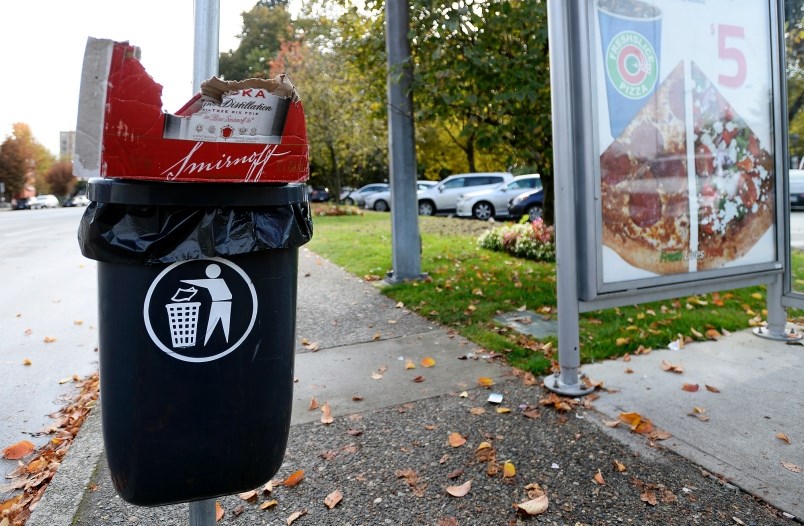New Westminster is taking aim at overflowing litter receptacles and litter on the streets by removing the bins.
A staff report states there has been a “significant and ongoing concern” in recent years about the use of public litter receptacles for disposing of residential- and business-related garbage. That’s resulted in regularly overflowing streetscape receptacles, increased litter on the street from those overflowing receptacles, increased rodent activities due to litter on streets, lowered service levels as staff try to keep up with overflowing receptacles and litter, and increased disposal fees for the city.
City staff has been monitoring and reviewing the use of litter receptacles in the Sapperton, Downtown and Uptown neighbourhoods for almost a year, and has found many locations where “excessive unauthorized use” has been observed, which has resulted in overflowing receptacles on a regular basis. When staff has removed, relocated or reduced the size of receptacles, there’s been a dramatic reduction in unauthorized use of the receptacles and less litter on the streets and open spaces.
“With regard to where does the garbage go if the receptacles are gone, what we have found is that people are generally more respectful of the area,” said Jonathan Marcone, the city’s supervisor of parks and open space maintenance. “What we have found is littering is kind of a faux pas so people don’t generally want to do it. When you remove the receptacle, you actually remove the illegal dumping in that receptacle and that area as well. We haven’t found an increase in the illegal dumping in other areas on the streetscape and laneways and things like that, and a reduction of litter as well.”
According to a staff report, many other jurisdictions, including New York City and San Francisco, have had similar results when reducing the number of litter receptacles.
Mayor Jonathan Cote said the concept of reducing litter by removing waste bins initially comes off “as a bit counterintuitive” but some communities have seen “dramatic improvements” when they’ve removed receptacles where people can dispose of their household litter.
“I think it is important to recognize this is not a cost-saving measure. We are not reducing staff by doing this,” he said. “It will actually allow our staff to do other very important maintenance and streetscape work that they can’t necessarily get to if they are servicing these.”
Given that it’s a new program and “everyone is a bit skeptical about its success,” Cote said the city needs to monitor the impacts and ensure receptacles are placed in areas where they are needed.
Coun. Chinu Das is skeptical that removing the bins is the way to tackle the litter problem.
“The garbage is not going away. My worry is if we are making it a smaller size or relocating it, it’s not going to remove the problem. It will remove the problem out of that area but my worry is: where is this garbage going to go?” she said. “Again, my concern is that the people who are misusing the system now will misuse it in some other way, and this will show up in the neighbourhoods and the garbage will be dumped in the neighbourhoods.”
Marcone said the city has not seen an increase in dumping in laneways and neighbourhoods in areas where changes have already been made.
Coun. Patrick Johnstone said the city has already heard from people who have noticed there are already fewer receptacles in areas like the downtown and Sapperton. He hopes the city tracks this issue and considers replacing the receptacles if they’re needed to address litter issues.
Marcone said staff has been keeping track of the litter situation for the past year and will continue to evaluate whether the changes are making a difference.
“We are finding that in some areas it is cleaner than it ever has been,” he said. “In other cases, where it needs some more attention, we now have the staff time to do it, whereas before we didn’t.”



